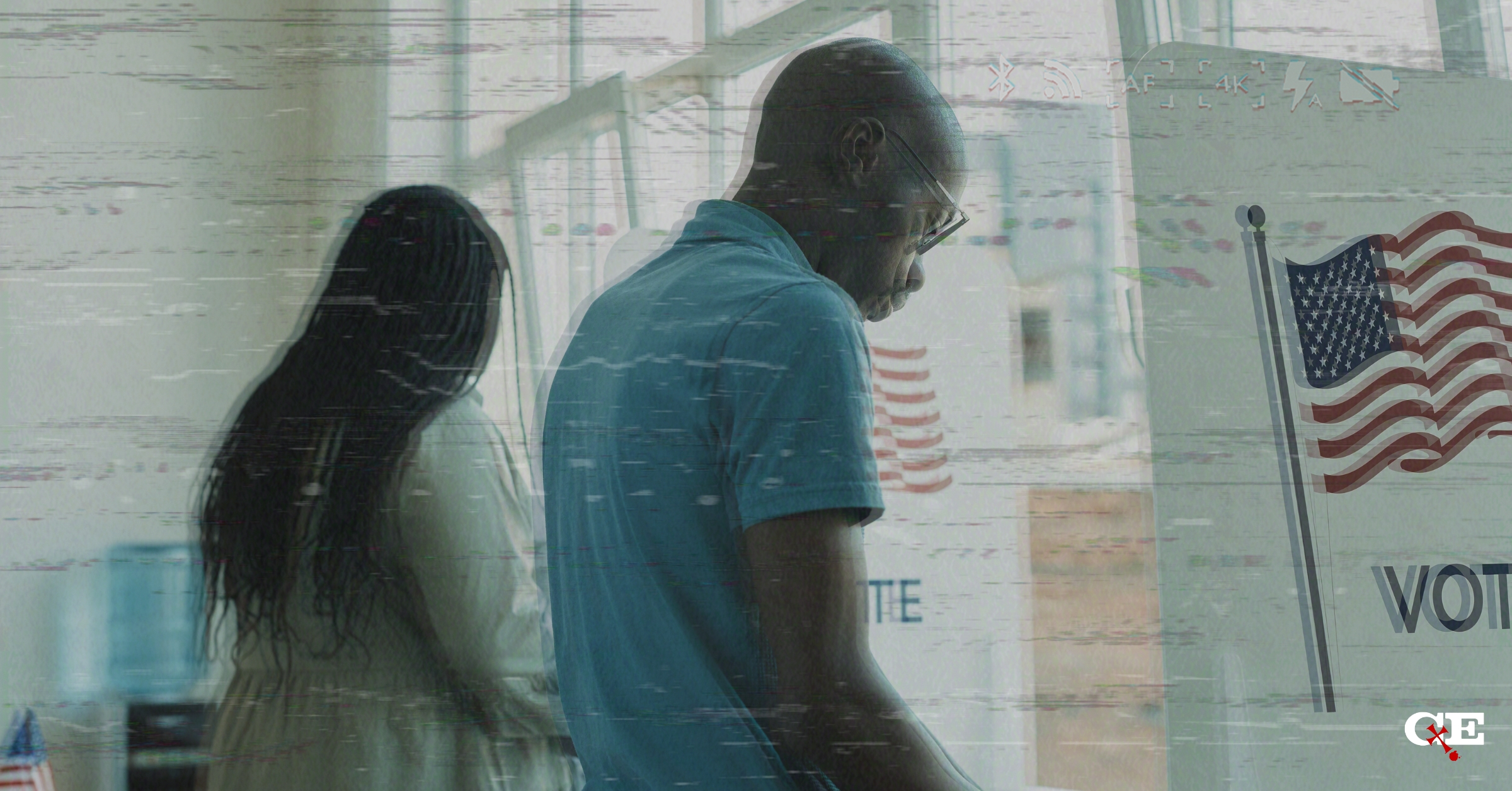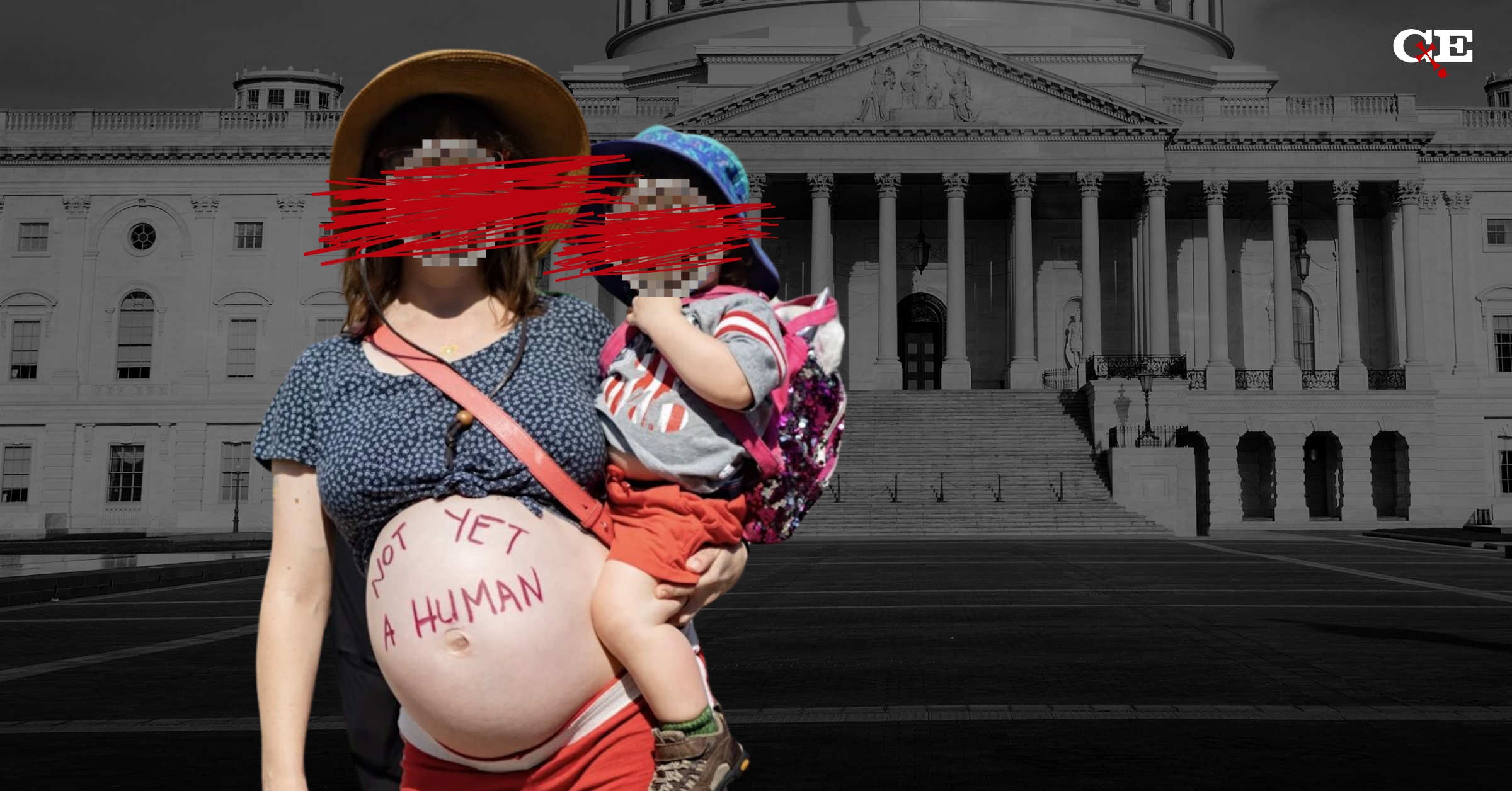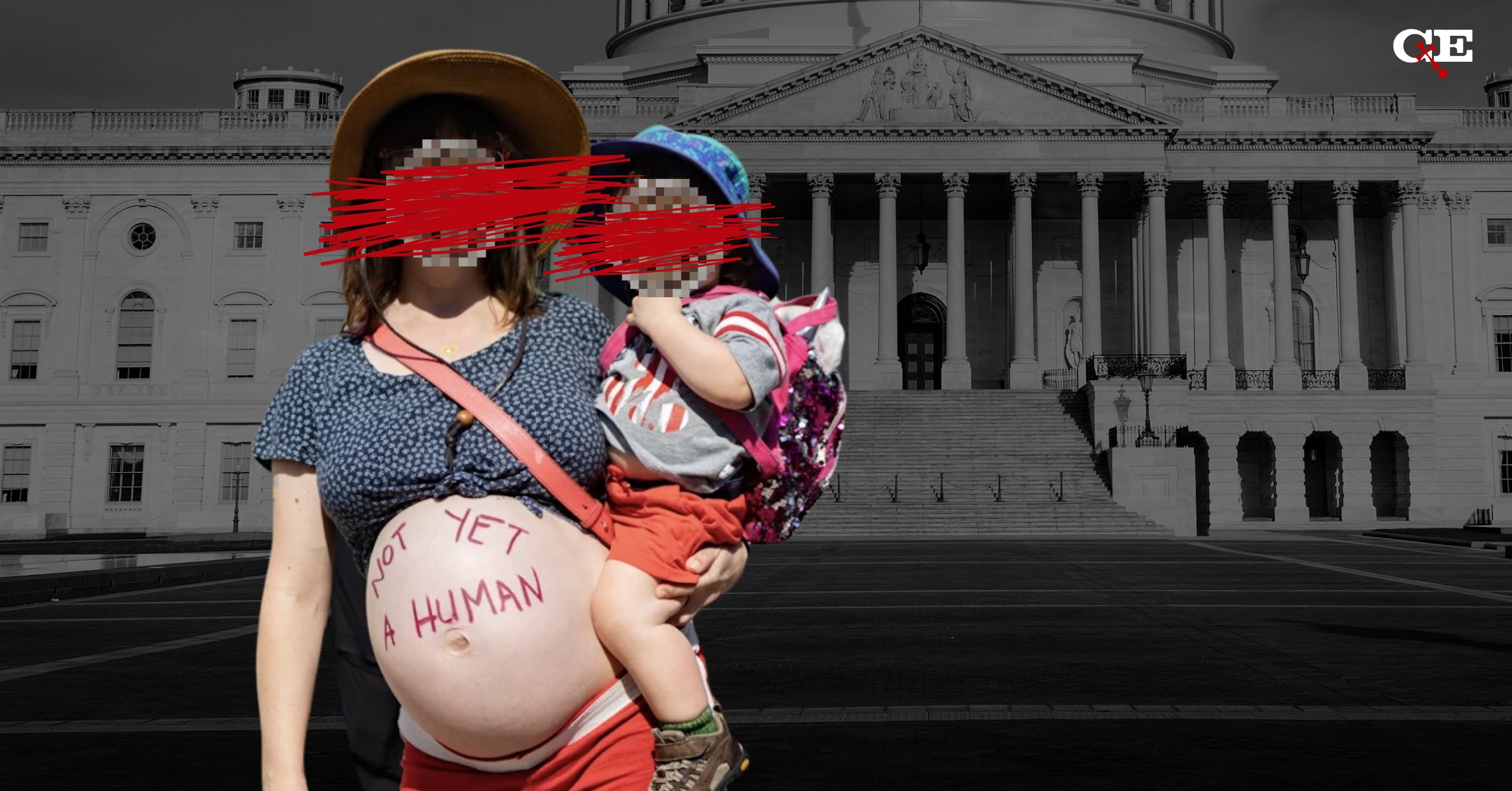[Editor’s Note: This blog was originally posted in 2014. While the general argument is still as relevant as ever, a lot has changed in the cultural landscape since then, most notably the 2022 Dobbs decision overturning Roe v. Wade. Plus, time-sensitive statistics are relative to 2014.]
The right to privacy just might be the most widely touted justification for abortion today. Implied within the right to life and to liberty, the concept of “privacy” demarcates the sacred domain of self-possession (my body), autonomy (my choice), and liberty (my freedom). Without at least some form of the right to privacy, one cannot defend against forced marriage, coercive medical procedures, physical abuse, slavery, forced labor or any other forms of coercion. And of course, abortion isn’t a “right” unless a mother can do what she wants with her body. One mantra, long circulated under the right to privacy is: “My Body, my right.” The (illicit) presumption is that bodily autonomy guarantees women of the right to abortion. But when these words are pressed, and the idea inside squeezes out, there might not be much pro-choice power left.
History of “My Body My Choice”
The right to privacy has legal roots in the 1927 Olmstead v. United States decision where the letter of dissent, penned by Justice Louis Brandeis, articulated this previously unstated right. The case concerned Olmstead’s suspected smuggle and sale of alcohol. The “privacy” issue regarded how authorities gathered evidence against him. Brandeis argued that our founding fathers had “conferred against the government, the right to be let alone – the most comprehensive of rights and the right most favored by civilized men.” Olmstead was convicted, by a 5-4 decision, on covert wire-tapping evidence, gained without a warrant. Brandeis’ dissent letter, however, proved pivotal forty years later in the 1967 Katz v. U.S. case which overturned the Olmstead ruling.
In between these events was the 1965 Griswold vs. Connecticut ruling where the right to privacy was applied to sexual ethics, thus bringing that conversation closer to the abortion debate of today.
In Griswold v. Connecticut the issue was contraception, specifically within marriage. The ruling found in favor of the Executive Director of Planned Parenthood, Estelle Griswold, who advocated for the free use of contraception (at least) within marriage. The predominate justification for their case? Privacy. Married couples have the right of privacy whereby they can choose for themselves whether to direct their sexual relations toward pregnancy or not.
Following the Griswold case, Eisenstadt v. Baird (1972) would extend the right of contraceptive access to unmarried couples as well. In that case, the right to privacy joined with the equal protection clause to give unmarried couples the same access to contraception as married couples. While the Eisenstadt case is important, the Griswold case is widely considered to be the more groundbreaking decision leading up to Roe v. Wade (1973).
In Roe v. Wade (1973), the right to privacy was one of the main justifications for the ruling, in favor of Jane Roe (Norma McCorvey), granting a qualified right of abortion access. Together with the concurrent Doe v. Bolton case (verdict rendered the same day, January 22, as Roe v Wade) abortion access was granted to U.S. women on an unprecedented scale. The privacy argument refers to a woman’s right to manage her body how she sees fit, with minimal intrusion from others. Her contraceptive practices are primarily her choice to make, in part, because she bears the greatest responsibility for what happens to her body be it pregnancy, sexually transmitted diseases, child-birth, or subsequent motherhood.
Roe v. Wade proved to be a controversial ruling, having been disputed ever since. Some sense of the “right to privacy”, however, has never been disputed, since it is understood that the federal and state government should generally respect individual citizen’s rights to conduct their private affairs privately, and to manage their own bodies with general freedom from interference. It is this special right (a.k.a., sacred right) that is implied when people say things like, “the government should stay out of my bedroom” or “you can’t tell me how to raise my child” or, more crassly, “keep your rosaries off my ovaries.” Pro-choice and pro-life advocates can all agree that there is some sort of privacy right implied in the basic legal and human rights of U.S. citizens. The terminology is not explicitly stated in our founding documents yet some sense of it has always been understood therein.
[Editor’s Note: The watershed case of Dobbs v. Jackson (2022) overturned Roe v. Wade (1973) Doe v. Bolton (1973) and Casey v. Planned Parenthood (1992). The decision confirmed that there was no explicit “right to privacy” mentioned in the Constitution, although, the concept still applies in regarding people’s general rights against spying, theft, illegal search and seizure, contraception, etc. Dobbs did not overturn Griswold or the Eisenstadt decisions, so those applications of “privacy rights” are maintained, even abortion is no longer included as a constitutional right]
But how far does that right to privacy extend? When pressed, it seems like there are some important qualifications that can be pitted against a blanketing sense of “privacy.”
1) Certain public health issues restrict the right to privacy
In some states, an HIV-carrier can be criminally tried for willfully spreading HIV if they don’t reveal their HIV status to their partner. Though his or her disease may, in some sense be “his body,” and “his own business,” it becomes a public issue when, under false pretense, he infects others. Similarly, a smoker may be allowed to smoke at home, but not necessarily at public restaurants or at work. It may be one’s personal right to smoke a cigarette, but since that private behavior has public consequences there is no universal right to smoke just anywhere one wants.
Furthermore, there are certain behaviors that are illegal even among consenting adults who, regarding their right to privacy, have no personal objections. Illegal drug use and prostitution are considered such pressing public health issues that we have governing prohibitions in place.
It might be exaggerating things a bit to call abortion a “public health crisis,” but that assessment has merit. In a brutally literal sense, medical abortion, among preventable causes, is by far the single leading killer for human beings of any age or race.
[1]* According to CDC reports for 2011, abortion claimed the lives of 1,058,490 children in utero, meanwhile malnutrition claimed 3,009 lives, various accidents (firearms or otherwise) claimed 126,438, suicides and homicide claimed 55,756.
[Editor’s Note: the current total, is now around 66,000,000 abortions from 1973-2025. And the yearly average is, again, around 1,000,000.]
Doubtless, there are preventable cases of heart disease and Type II diabetes that could be added to those numbers, but it should be clear that the million plus deaths annually from abortion easily tips the scales when compared against other preventable deaths. Were there more than a million deaths from salmonella poisoning, or malnutrition, or suicide, or drug trafficking, or medical malpractice, then hardly a politician in Washington would fail to join the campaign against such preventable fatalities. Those numbers would easily count as a public health crisis in any other field. Even when a basic right to privacy is granted, public health crises present a plausible boundary line for personal autonomy. People might have a general right to do what they want with their bodies, but not necessarily if their actions constitute a public health crisis and especially not if their behavior extends that health crisis into killing other human beings.
2) There is no privacy right regarding child-abuse.
It is widely granted that parents have a right to raise their (minor) children how they see fit. Their home is a private bastion of liberty where they can talk, think, feel, hope, believe, and generally act as they see fit. This includes child-rearing, discipline, character formation, and even naming one’s children with most any name one sees fit. This domain of freedom has also been touted in justifying home schooling and personal choice of religious or non-religious education. Yet in spite of all that liberty at home, there is no “privacy right” allowing sexual, physical, or gross verbal abuse. The children are still individual human beings with their own rights even if their status as minors nuances their legal autonomy. In these circumstances, the general right to privacy for parents is bounded by a more basic right of the child’s right to life, liberty, and his/her pursuit of happiness. Phrased ethically, the parents have a moral responsibility to care for and support their children towards health and well-being and not treat them like slaves, robots, sex partners, or punching bags.
Regarding the subject of abortion it is common parlance to refer to a pregnant woman as a “mother” and to refer to her gestating human fetus as her “child,” i.e., “mother and child.” There is legal precedence for referring to the preborn human being as a “child-in-utero” and to the pregnant woman as “mother” (see, The Unborn Victim of Violence Act, 2004). To be fair, she may prefer not to be a mother, she may scorn motherhood, or otherwise dislike being called a mother, but biologically she has begun motherhood as soon as another human being has begun inside of her. She does indeed have great and rightful freedom to conduct herself how she sees fit, but now that another human being is involved – and biologically there’s no dispute over whether the child-in-utero is a genetically distinct homo sapien – she is a mother and any abusive acts on that human inside of her is literally child abuse. Admittedly, the legal system, via the Unborn Victims of Violence Act, does not deem assaults on children-in-utero as “abuse” unless the child is harmed by an aggressor besides the mother.[2]
The child’s physiological status, however, is the same regardless of whether the child is killed by an assailant or by an abortion doctor; whether the child is wanted or not. He or she is still an abused child in terms of the malicious and fatal harm inflicted on them. He or she is no less harmed regardless of who is doing the abusing, or what their intentions might be.
3) There are competing responsibilities of parenthood
Similar to the last point, it should be noted that parental behavior regarding their own bodies can still harm their children. While parents have a general right to privacy regarding their own bodies, their bodies, nonetheless, are part of their person so that gross negligence of their own bodies or abandonment are unethical and sometimes illegal.
If a single parent says, “It’s my body, and I want my body to be in California” but their 5 year-old child is in Maryland, then that parent’s autonomy is competing with his or her legal responsibility as a parent. To leave that child unaccompanied in Maryland is child abandonment. Moreover, if that parent participates in illegal drug activity, prostitution, or otherwise extremely risky behavior the state can rightly take that child away from that parent for his or her gross negligence. One could even be ethically and legally culpable for willfully self-destructive behavior like suicide attempts, morbid obesity, abusing over-the-counter drugs, or any number of behaviors that leave children with a dangerously unreliable parent. That parent’s right of privacy infringes on his or her responsibility as a parent, and in some cases that parent’s behavior is both criminal and unethical.
Regarding abortion, a woman might not want to think of her preborn child as a “parasite” or wish any harm on it, but she does want it out of her body to let “nature take its course.” In that sense, she may seek a more gentler characterization of the abortion process so that her behavior is construed passively, selflessly, or in otherwise nicer tones. In that way an abortive mother may try to baptize her intentions so that she’s not willing any harm, or she is aiming for the “greater good.” These efforts have some ethical value, but do not necessarily counterbalance the fact that a mother’s children have some rightful expectations that she will not deliberately destroy herself or harm them through her body.
For example, it is unethical for a smoking mother to give her prenatal child cancer or birth defects, or for her to use illicit drugs and deliver a crack baby, or to acquire HIV and knowingly confer it to her pre-born child. These acts are not just done to one’s self, but directly affect someone else. It is no longer a strictly “private” issue now that someone else is involved. Abortion, as such, is not just an act on the mother’s body but also harms the child. For example, some abortificients (abortion medications) are known to reduce the mucosal lining in the uterine wall where the embryo would otherwise implant. This leaves the embryo with nowhere to go, it is expelled from the womb. The pill was an action of the mother, affecting her own body, but its effects did not rest with the mother. The effect was a silentabortion, where another human life was taken. In this way, abortion can be ethically similar to other actions of mothers that harm their babies–even if the action was intended to be of a different sort, like smoking for pleasure, or drinking for fun, or taking recreational drugs to hide from the world. These acts might have different ethical weight themselves, but all of them also carry the ethical weight of child-abuse when they harm the child-in-utero.
4) There are competing responsibilities of citizenship
Some minimal responsibilities are expected in exchange for the many rights and privileges of citizenship. For example, one is not at liberty to plot treason against one’s president nor to attempt to assassinate the president, even if one is only “planning” such a thing without yet acting. It is illegal to even conspire to do such anti-government activities. It does not matter if one’s activities are all contained within personal journals with the materials kept in one’s home. One may have a right to bear arms, but not to bear the schematics for an assassination attempt. Frankly, a person might even be “joking” yet if the threat looks real enough, that behavior could be grounds for criminal charges. The right to privacy does not grant unqualified liberty to mobilize one’s private domain for public harm, as that is no longer a merely private matter.
Ever since Roe v. Wade pre-born children are not considered legal persons and therefore do not have the rights of citizenship. [Editor’s Note: And while the Dobbs decision overturned Roe, it did not establish federal “personhood” status for children-in-utero. Abortion policy reverted to the states, along with any related “personhood” amendments.] The mother, presumably, would still have that right of citizenship qualifying her for special privileges granted to U.S. citizens like miranda rights or voting rights in U.S. elections. She would also be subject to the laws of the land, and so she has laws which prevent her from child abandonment and child abuse, and of course child mutilation, and serial murder of children. Her privacy is already infringed upon regarding her motherhood, such that she has civil duties as a mother.
[Editor’s Note: All these duties apply to fathers as well, as bodily autonomy and the right of privacy do not, normally, entail any “license to kill” innocent human beings, especially one’s own child. Abortion-choice policy, of course, remains the lone legal exception to that humanitarian basic.]
The preborn child is at least analogous to the born child such that it’s no stretch of the imagination to think a real mother should act like a real mother, even if she’s only pregnant right now. Also, if any further legal precedents are established that raise the relative legal status of the child-in-utero, then they might come closer in status to “citizens” and be a more rightful boundary on the “right of privacy.”
5) It is illegal to use one’s body to injure or kill other people without other overriding justifications
It is illegal in many cases, and unethical in more cases, to use one’s body to harm others. A person has the right to go skydiving, but not to willfully land on another person killing them. In that case, both parties are killed. Two evils have been done – both being a kind of homicide. Of course, successful suicides can’t be prosecuted, but it’s still a criminal act, and there’s little dispute about whether it’s generally evil to kill oneself, especially if someone else is killed too.
On a lesser scale, a person might jokingly fall all over people at a party receiving bumps and bruises and giving them as well. The person might be amusing, but he’s still harming other people by use of his body. One’s right to privacy is restricted by the general principle of non-malfeasance: that is, do no harm to others. Even if one’s own very body becomes the instrument of harm, it is still unethical and in many cases illegal, to harm other human beings with one’s body. Abortion involves a mother’s instrumental use of her body, by a doctor’s assistance, to create a hostile environment for the child-in-utero. To use one’s body for harm is still unethical, and not a natural privilege within the “right of privacy.”
6) Rights to privacy can be abdicated
In the case of Bowe Bergdahl American audiences were scandalized, in part, by his reported treachery, as his “right to privacy” did not include the privilege to endanger his fellow soldiers. Bergdahl, a soldier for the U.S. Army, who legally swore allegiance to the U.S. Army, and allegedly betrayed his fellow soldiers abandoning his post, going AWOL, with intent to ally with the enemy. If those reports are validated and Bergdahl is found guilty, he will not have a strong “right to privacy” defense in his favor.
[Editor’s Note: Bergdahl He was held captive by the Taliban from 2009-2014 despite his alleged efforts ally with the enemy. He was court martialed and found guilty in 2017, fined, and dishonorably discharged. In 2023 his case was appealed and his conviction overturned].
By swearing allegiance and signing his respective contracts he made a substantial commitment to the United States of America to loyally serve as long as he is able and allowed. He retains his freedom of conscience throughout (he could agree with the enemy if he wants). He retains some freedom of speech (he can say what he wants in his journals). He retains freedom of religion (he can worship or not worship however he sees fit). But his body is not fully his own, since he abdicated certain privileges of free citizenship for the sake of becoming a soldier.
Bergdahl is not unique here either. Most every working man or women abdicates some degree of personal freedom and privilege for the sake of conforming to a work environment. That’s the price people pay so they can bring home a paycheck. People can exercise their right to privacy by not working in those jobs. If they don’t want to agree to their terms they don’t have to work for that business. Fashion and film industry can have rigorous expectations of their employees, “You must dye your hair,” or “You have to be willing to do nude scenes,” or “you cannot let your body weight exceed 115 pounds.” People may also abdicate certain privacy rights as legal punishment. Some criminals are forced to wear trackers monitoring their location in the event of trespassing on a restraining order. One of the paradoxes of the right to privacy is that as a facet of bodily autonomy, people can exercise their bodily autonomy by sacrificing certain aspects of privacy.
Regarding abortion, a parent’s right to privacy might be restricted by parental duties but that very privilege to choose to get pregnant or raise a child is itself a rightful exercise of one’s privacy. Even if the pregnancy was forced on the woman, through violent rape, molestation, or incest, those horrific evils don’t implicate the child. It’s not like the child-in-utero did anything deserve a death-sentence. The mother’s right to privacy and bodily autonomy are grounds for prosecuting the rapist, not for punishing the child.
Parenthood has always been a normal constraint on one’s privacy. It’s a heavy blessing people assume when they are willing to invest some of their freedom as a sacrifice for the benefit of children. Reluctant parents may have a harder time coping with the lifestyle change, but that doesn’t change the fact that they are parents and parenthood naturally constrains our privacy. Those who do not want that constraint would do well to avoid parenthood. Killing one’s child, however is not “avoiding parenthood,” since parenthood has already begun at conception. That is more like willful failure as a parent.
So, What’s Left of ‘My Body My right’?
Bringing all these different qualifications together, a stiff critique emerges against certain liberal uses of the “right to privacy.” We can, and should, grant a qualified sense of the right to privacy without assuming that that right includes the license to kill innocent human beings by way of abortion.
References:
[1] The CDC reports the total deaths for the U.S. population as ranging between 1.9 million and 2.5 million between 1970 and 2011 per year not including abortions. In that same time frame, abortion rates ranged from 0.74 to 1.3 million abortions. In 2011, those reports estimate that there were 2,515,458 deaths (not counting abortions) and 1,058,490 abortions, making abortions about 1/3 of all fatalities in the U.S. Yet even these numbers are skewed because natural abortion (miscarriages) are not counted whereas natural deaths that occur as complications from old age are counted. Abortions might be better compared to preventable circumstances like workplace accidents, traffic fatalities, or preventable diseases like Type-II diabetes.
[2] One could argue that our legislation is due for updating since 1973. Some things that have since been legalized in the name of abortion create inconsistences for established laws, precedents, and ideals within our legal system. For example, mutilating a human corpse for the sake shipping purposes is illegal, but if it’s in utero then that is standard practice of dilation and curettage abortions. Likewise, a pregnant mother who is woefully derelict of her maternal duties cannot be legally tried for all the negligence and abuse inflicted on her preborn-child, yet if it’s a “wanted” baby that would seem to make her the aggressor against the child as in the “Lacy and Connor Law” so that if she kills the baby through drug and alcohol abuse, she could be tried for negligent homicide, manslaughter, or at least child abuse. Likewise, if a pregnant woman is assaulted on the way to the abortion clinic, intending to get an abortion, and miraculously the thief forgets to take her wallet but does push her down, killing the child on impact–he actually saved her time, and money by killing the baby in a much shorter fashion. He can be criminally charged for killing the child, for assault, and for theft, yet the thief was only incidentally involved in an abortion procedure intended by the mother. The mother’s “intentions” did not change the nature of that child any more than it changed the ethical status of that assault.
Recommended Resources:
Correct, NOT Politically Correct: How Same-Sex Marriage Hurts Everyone (Updated/Expanded) Book, DVD Set, Mp4 Download by Frank Turek
Sex and Your Commanding Officer (DVD) (Mp4 Download) by Dr. Frank Turek
Legislating Morality (DVD Set), (PowerPoint download), (PowerPoint CD), (MP3 Set) and (DVD mp4 Download Set)
Does Jesus Trump Your Politics by Dr. Frank Turek (mp4 download and DVD)
Dr. John D. Ferrer is a speaker and content creator with Crossexamined. He’s also a graduate from the very first class of Crossexamined Instructors Academy. Having earned degrees from Southern Evangelical Seminary (MDiv) and Southwestern Baptist Theological Seminary (ThM, PhD), he’s now active in the pro-life community and in his home church in Pella Iowa. When he’s not helping his wife Hillary Ferrer with her ministry Mama Bear Apologetics, you can usually find John writing, researching, and teaching cultural apologetics.
Originally posted at: https://bit.ly/4mBhosw












